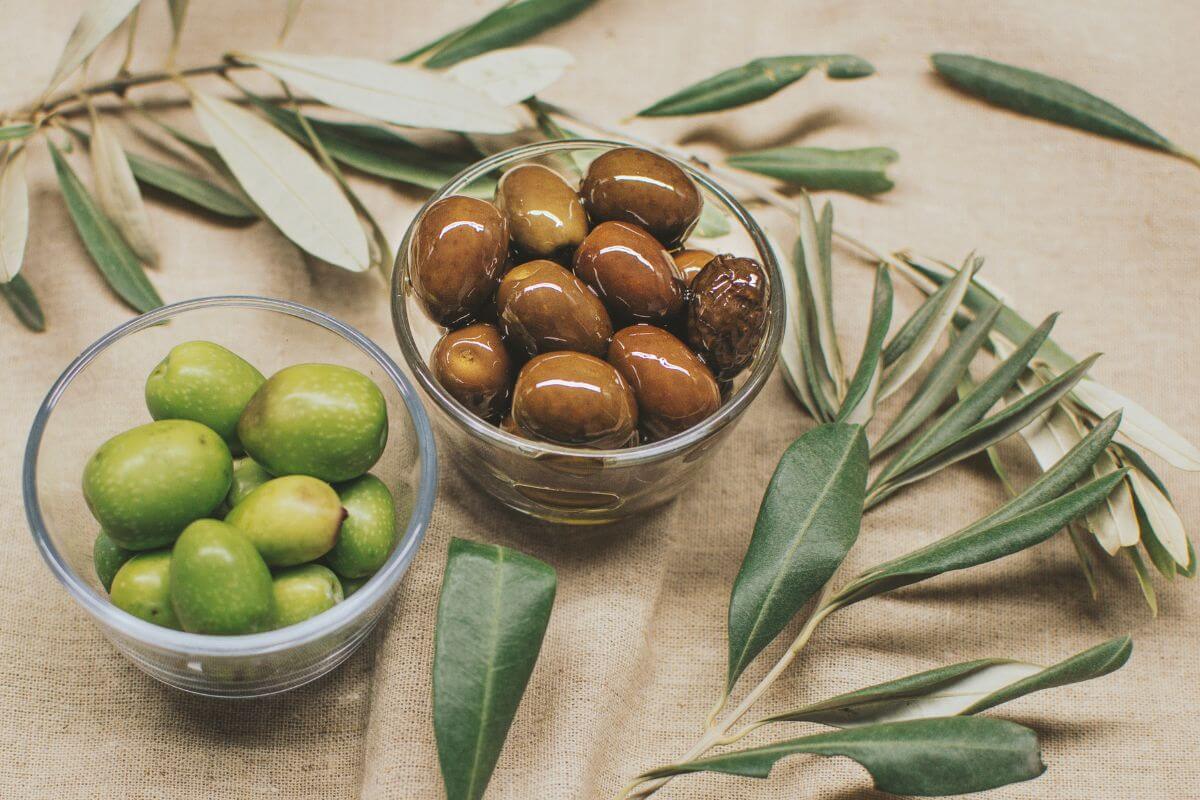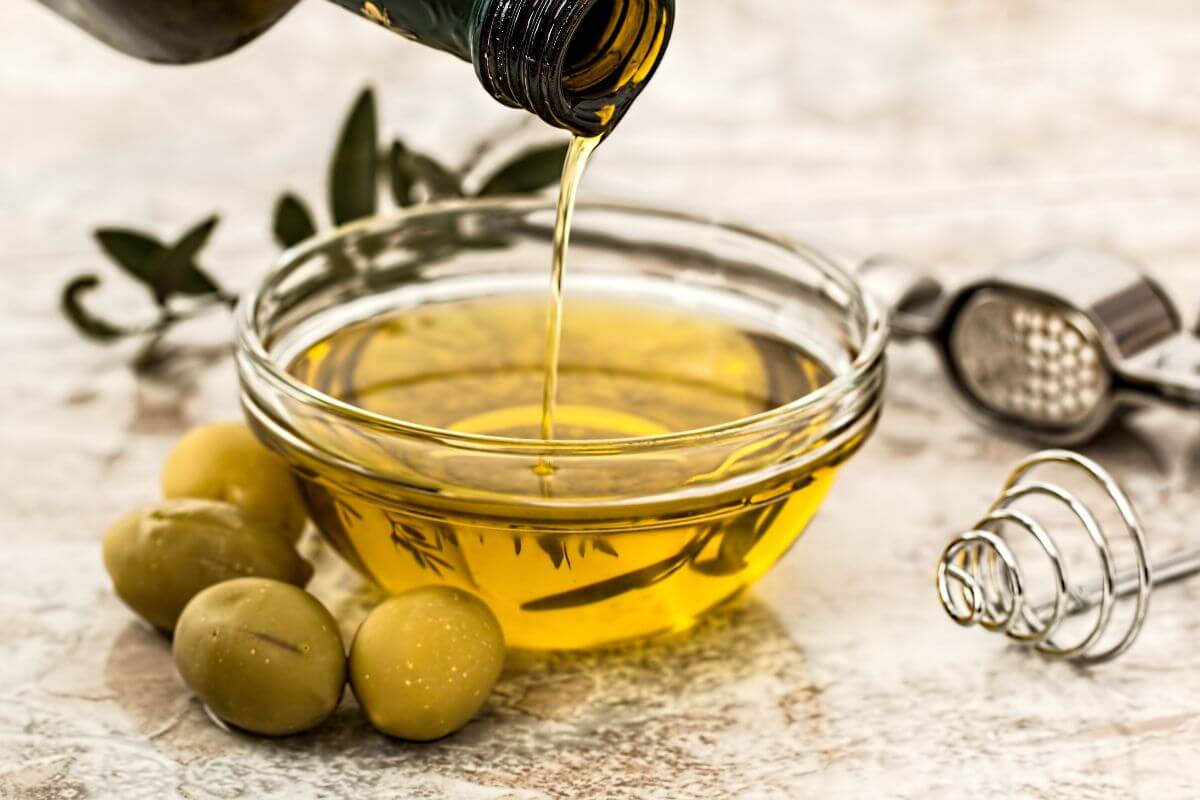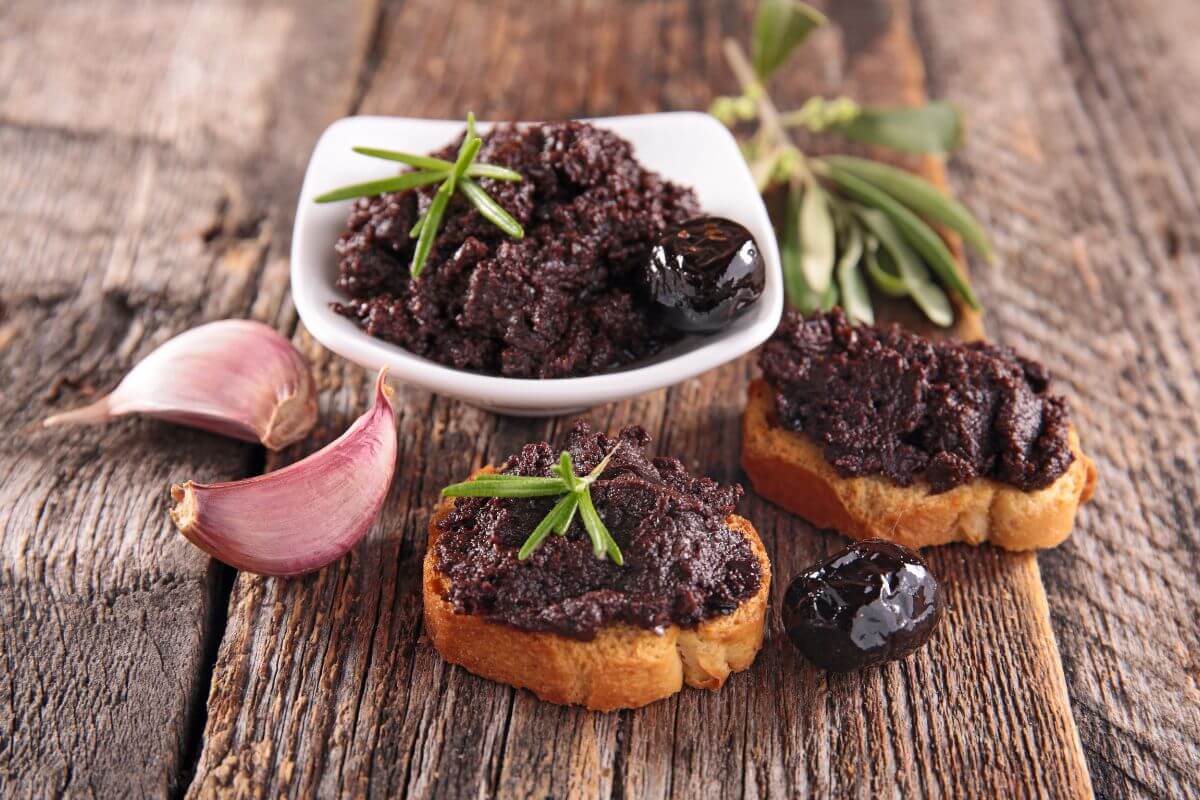Ever bitten into an olive and wondered if you’re eating a fruit or a veggie? You’re not alone. This tiny, savory morsel has puzzled food lovers for ages. Let’s uncover the truth about olives and their surprising identity.
Olives are botanical fruits but culinary vegetables. They grow from the olive tree’s flowers and contain a pit, making them stone fruits like peaches. Yet in the kitchen, we use them like veggies in salads, pizzas, and tapenades.
Ready to dive deeper into the world of olives? You’ll discover their unique classification, health benefits, and tasty ways to enjoy them. Get ready for a flavor-packed journey that might just change how you see these little green (or black) wonders.
- Related article: How Is a Fruit Different From a Vegetable?
5 Key Takeaways on Is the Olive a Fruit or Vegetable
- Olives are fruits. Botanically, they are drupes because they have pits that come from the flower of the olive tree.
- Olives are used in cooking like vegetables. Olives are key in Mediterranean dishes. You see them in salads, on pizzas, in pasta, and as appetizers. Their savory, salty taste makes them popular.
- Olives are healthy. They are low in calories and fat. They are rich in vitamins C and E and fiber. They are a big part of the Mediterranean diet. This diet is known for its health benefits. It can help you live longer and reduce the risk of chronic diseases.
- Eating olives can help with weight management. They are low in calories and help you feel full. Olives also have oleocanthal. This compound fights inflammation and supports heart health.
- You can use olives in many ways. Add them to salads or blend them into dips like tapenade. They are great as appetizers. Olives are not just for Mediterranean dishes. They add flavor and nutrition to many cuisines worldwide.
Are Olives Fruits or Vegetables?

Have you ever wondered about the true nature of olives? I’ve often pondered this question myself. Let’s dive into the tasty world of olives and uncover their secret identity.
Olives are tricky little morsels. They’re not sweet like most fruits we know. But here’s the kicker: olives are actually fruits! They grow from the flower of the olive tree and have a pit inside. This makes them a stone fruit, just like peaches or plums.
But wait, there’s more to this olive mystery. In the kitchen, we often use olives like vegetables. We toss them in salads, blend them into tapenades, or use them to top pizzas. This is why many people think of olives as veggies.
Olives fit both descriptions! They’re fruits by nature but vegetables in the culinary world. It’s like they’re living a double life.
Why Are Olives Fruits?
Botanists classify the olive as a fruit, specifically a “drupe” or “stone fruit.” This means olives have pits or stones that serve as seeds for the Olea europaea tree.
Olives are similar to fruits like peaches, apricots, and cherries, which also have pits. But taste doesn’t determine if something is a fruit or vegetable.
The classification of a fruit is based on the plant’s reproductive body and process. For olives, this involves a tree. The Encyclopedia Britannica defines fruit as “the fleshy or dry ripened ovary of a flowering plant, enclosing the seed or seeds.”
Plant an olive pit in the ground and, over time, a slow-growing olive tree will sprout.
If you love green olives, this might be a fun project to try.
Why Are Olives Vegetables?
Olives are considered vegetables in cooking because they are used in side dishes and main dishes. They are salty and not sweet like fruits.
Green or black, olives are versatile in many dishes. You might find them as appetizers, on pizzas, in salads, pasta, or vegetable sides.
The color doesn’t change their classification. Black olives are just more ripe than green olives. Both have the same nutritional value because black olives stay longer on the tree.
What Are the Health Benefits of Olives?

Olives offer many health benefits. They are low in fat and calories with only about 6 calories per olive. They also provide lots of vitamins C, E, and fiber.
This fruit is a key part of the famous Mediterranean diet. It’s a major export crop along with olive oil. Olives are grown in Mediterranean countries like Italy, Spain, Turkey, Greece, and Morocco.
Italy has 24% of its population over 65 years old. The Mediterranean diet helps contribute to their long lives.
The vitamins and antioxidants in olives offer many health benefits. Different varieties of olives can provide these benefits.
1. Olives Aid in Weight Management
Feeling hungry before a meal? Grab a few olives! These tiny green fruits pack a punch when it comes to controlling your appetite. You’ll only take in about 6 or 7 calories per olive. That’s less than what your body uses to digest them!
Olives have a secret weapon: monounsaturated fatty acids. These healthy fats slow down digestion and trigger a hormone called cholecystokinin. What does that mean for you? You’ll feel fuller faster and stay satisfied longer.
Here’s a quick tip: eat a handful of olives before lunch or dinner. It’s an easy way to curb your hunger and avoid overeating. Plus, you get to enjoy their salty, savory flavor. Win-win, right?
Have you ever tried different types of olives? There’s a whole world of flavors waiting for you to explore. From tangy green ones to rich black varieties, each offers its own unique taste. Why not mix things up and find your favorite?
2. Olives Help Fight Inflammatory Diseases
Olives know no bounds when it comes to health benefits. They contain a special compound called oleocanthal. This compound fights inflammation in your body. It stops certain enzymes from causing problems like type 2 diabetes or arthritis.
But that’s not all. Oleocanthal also acts as a natural painkiller. It works similar to ibuprofen but comes straight from the olive fruit.
Have you ever wondered why some foods make you feel better? Olives might be one of those secret weapons in your kitchen. They’re not just tasty. They’re also working hard to keep your body in top shape. Next time you snack on olives, remember you’re doing your body a favor.
Why not try adding more olives to your meals? Your taste buds and your body will thank you.
3. Olives Support Cognitive Function
The olive fruit is fantastic for brain health. These tiny powerhouses contain natural chemicals called polyphenols. These polyphenols fight oxidative stress in your brain. This stress can harm your brain cells over time.
Let’s dive into some exciting research on mice from 2013. Scientists found that adding olive polyphenols to their diet boosted important brain factors. These factors included neurotrophins and brain-derived neurotrophic factors. They also increased nerve growth factors. Why does this matter? These factors play a key role in keeping your brain cells alive and thriving.
I’ve seen firsthand how adding olive fruit to my diet has improved my mental clarity. You might want to try snacking on a few olives each day. Or drizzle some extra virgin olive oil on your salad.
4. Olives Support Gut Health
Olives are a type of fruit called drupes. They’re not just tasty but also good for your gut health. Fresh olives have probiotics that can boost your digestive system. These helpful bacteria come from the natural fermentation process.
But watch out! Canned or jarred olives don’t have these benefits. The pasteurization process kills off the good bacteria.
Olives are also fiber powerhouses. Every 10 olives gives you about 1.5 grams of fiber. This fiber is like food for your gut’s good bacteria. It helps them thrive and protect your overall health.
I love snacking on olives. They’re a great way to add flavor to your meals while supporting your gut health. Have you tried adding them to your salads or pasta dishes? It’s an easy way to boost both taste and nutrition.
5. Olives Help Lower the Risk of Heart Disease
Olive oil is loaded with fatty acids. Did you know that a whopping 73% of it is oleic acid? That’s pretty impressive for a surprise fruit! The rest breaks down into 11% omega-3 and omega-6 fatty acids and just 15% saturated fat.
Here’s something cool about olives: they’re heart-friendly. The monounsaturated fat in them boosts your good cholesterol. Scientists have found this type of fat helps lower blood cholesterol. And guess what? That means it might cut your risk of heart disease too.
I’ve used olive oil in my cooking for years. It’s amazing how versatile it is. You can drizzle it on salads or use it to sauté veggies. What’s your favorite way to use olive oil? Have you noticed any health benefits since adding it to your diet?
6. Olives Help Prevent Diabetes
Olive oil isn’t just for cooking. It might help keep diabetes at bay too. Research shows that adding olive oil to your meals could lower your chances of getting type 2 diabetes. How? It seems to help your body manage blood sugar levels better.
This makes olive oil different from common fruits in a surprising way. It’s not sweet but still impacts your sugar balance.
Have you ever thought about swapping your regular cooking oil for olive oil? It could be a tasty way to look after your health.
7. Olives Support Skin Health

Olives are powerful protectors of the skin. These common drupes are loaded with antioxidants that fight off pesky free radicals. Why does this matter? Free radicals can speed up aging and cause skin problems. But olives have your back!
The antioxidants in olives team up with vitamins A and E to protect your skin. They shield you from harmful UV rays and help prevent skin issues. It’s like having a natural sunscreen and skin guard in one tasty package.
But wait, there’s more! Vitamin E boosts blood flow to your scalp. It even helps create new tiny blood vessels. This means better nourishment for your hair follicles. And don’t forget about vitamin A. It keeps your skin’s pH in check, maintaining that healthy glow.
8. Olives Help Protect Bones and Heal Wounds
Olives pack a powerful punch with their unique compound, oleuropein. You won’t find this special ingredient in any other fruit. It works hand in hand with hydroxytyrosol to keep your bones strong. These two compounds are like superheroes for your body.
Want to avoid brittle bones as you age? Olives might be your new best friend. They help fight off osteoporosis and even speed up healing for cuts and scrapes. But that’s not all! These little green wonders also give your hormones a helping hand.
Have you ever noticed the vibrant green color of olives? It’s not just pretty to look at. That rich hue hints at the health benefits hiding inside.
9. Olives May Reduce the Risk of Cancer
Olives are warriors against cancer. They contain oleocanthal, a compound that can destroy cancer cells. Extra-virgin olive oil might also lower your risk of breast cancer and other types. I’ve seen firsthand how adding olive oil to meals can make a big difference.
Why not try drizzling some on your salad tonight? It’s an easy way to boost your health. Plus, it tastes great! Have you ever tried cooking with olive oil instead of butter?
Just remember, a little goes a long way. What’s your favorite way to use olive oil in your cooking?
Different Ways to Add Olives to Your Diet

Olives are a tasty way to spice up your meals. Let’s explore some fun ideas to add them to your diet:
- Mix olives into salads for a salty kick
- Layer them in sandwiches and wraps
- Sprinkle on pizzas for Mediterranean flair
- Blend into dips like hummus or tapenade
- Toss with pasta dishes
- Include on antipasto platters
- Garnish cocktails like martinis
- Roast with veggies
I love adding kalamata olives to my Greek salads. The briny flavor pairs perfectly with feta cheese and crisp veggies. You can also chop up green olives for a zesty tuna salad sandwich.
Have you tried making your olive tapenade? It’s super easy. Just pulse olives, capers, garlic, and olive oil in a food processor. Spread it on crackers or use it as a dip for veggies.
For a quick weeknight dinner, toss some pasta with olive oil, cherry tomatoes, and sliced olives. Add a sprinkle of Parmesan cheese and you’re good to go.
Don’t forget about drinks! A dirty martini with olive juice is a classic cocktail. Or try adding olive skewers to Bloody Marys for a savory garnish.
By adding olives to your meals, you’ll get more healthy fats and Mediterranean flavors. Plus, they make everything taste better. What’s your favorite way to eat olives?
Is Olive a Fruit or Vegetable? Final Thoughts
Olives are a tasty treat that can be both a fruit and a veggie. It all depends on who you ask. But here’s the cool part — no matter what you call them, olives are awesome for your health. They’re packed with good stuff that helps your body stay strong and fight off sickness.
I love snacking on olives. They’re like little flavor bombs that pack a nutritious punch. You can toss them in salads, blend them into dips, or just pop them in your mouth as a quick snack. Trust me, your taste buds and your body will thank you.
For more on fruits and vegetables, check these articles out:

